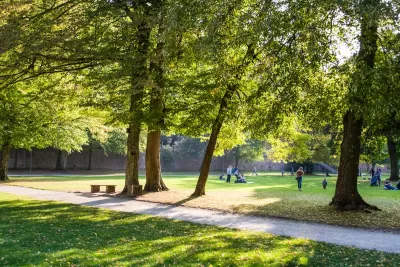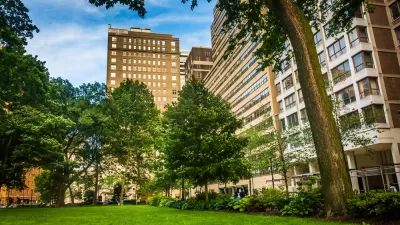The Urban Land Institute offers fact sheets describing five innovative ways that parks can reduce carbon emissions and mitigate climate threats while advancing health, equity, and quality of life in urban areas.

Parks play a crucial role in advancing sustainability by providing green spaces that perform a variety of important functions, such as mitigating the urban heat island effect, promoting biodiversity, and acting as natural air filters to improve air quality. Parks also contribute to communities' ability to withstand and recover from challenges such as extreme weather events and climate change. They offer natural flood management by absorbing excess rainwater, reducing the risk of floods. This capability is enhanced by incorporating features like rain gardens and permeable pavements. In addition, parks provide spaces for community gathering and recreation, promoting physical and mental well-being.
The Urban Land Institute (ULI) recently published the following five fact sheets which explain how parks and green spaces can reduce carbon emissions and mitigate climate threats, while advancing health, equity, and quality of life in urban areas:
- Promoting Green Infrastructure
- Supporting Ecosystem Restoration
- Mitigating Urban Heat
- Leveraging Parks as Carbon Sinks
- Investing in Solar Energy
For more information, please visit this link.
FULL STORY: How Parks Advance Sustainability and Resilience

Alabama: Trump Terminates Settlements for Black Communities Harmed By Raw Sewage
Trump deemed the landmark civil rights agreement “illegal DEI and environmental justice policy.”

Planetizen Federal Action Tracker
A weekly monitor of how Trump’s orders and actions are impacting planners and planning in America.

The 120 Year Old Tiny Home Villages That Sheltered San Francisco’s Earthquake Refugees
More than a century ago, San Francisco mobilized to house thousands of residents displaced by the 1906 earthquake. Could their strategy offer a model for the present?

In Both Crashes and Crime, Public Transportation is Far Safer than Driving
Contrary to popular assumptions, public transportation has far lower crash and crime rates than automobile travel. For safer communities, improve and encourage transit travel.

Report: Zoning Reforms Should Complement Nashville’s Ambitious Transit Plan
Without reform, restrictive zoning codes will limit the impact of the city’s planned transit expansion and could exclude some of the residents who depend on transit the most.

Judge Orders Release of Frozen IRA, IIJA Funding
The decision is a victory for environmental groups who charged that freezing funds for critical infrastructure and disaster response programs caused “real and irreparable harm” to communities.
Urban Design for Planners 1: Software Tools
This six-course series explores essential urban design concepts using open source software and equips planners with the tools they need to participate fully in the urban design process.
Planning for Universal Design
Learn the tools for implementing Universal Design in planning regulations.
Clanton & Associates, Inc.
Jessamine County Fiscal Court
Institute for Housing and Urban Development Studies (IHS)
City of Grandview
Harvard GSD Executive Education
Toledo-Lucas County Plan Commissions
Salt Lake City
NYU Wagner Graduate School of Public Service





























